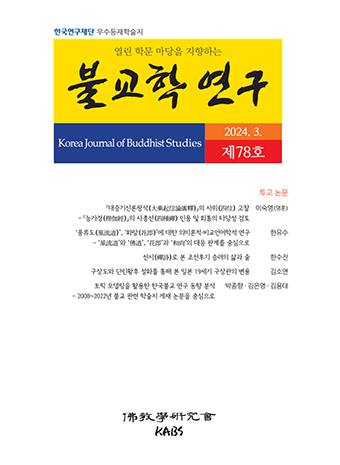Abstract
References
Sorry, not available.
Click the PDF button.
Information
This paper analyzed the meaning of the modernity of Baek Yongseong's Daegakgyo (Teaching of Great Enlightenment), through his understanding of the Mind. In the context of the 'encounter between the traditional and the modern, and the response' during Joseon's modernization period, Baek's Daegakgyo has been often evaluated as conservatism that has simply followed the path of Chan Buddhist traditions.Daegakgyo's Enlightenment is based on the understanding of the Mind advocated by traditional chan buddhism. But Baek not only asserted his concept of Self- awakening to establish the tradition of Chan Observing the Hwadu. For him, Self-enlightenment was a response to the Christian criticism of Buddhism as a religion of idolatry and tradition, it also held the significance of the Buddhist identity as a modern religion. Awakening others is the ideology that Baek came up with as a rediscovery of the Buddhist tradition of salvation of sentient beings which had been forgotten in the Chan Buddhist tradition, in the face of the socialist anti-religious movement. For Baek, awakening others was the ideology that Buddhism needed to focus on in order to mature into a modern religion. Baek's Daegakgyo is a traditional thought that was rediscovered in the course of establishing Buddhism as a modern religion against the criticism of modern Western civilization represented by Christianity and Socialism. Tradition, in this context, does not indicate conflict with modernity, it includes modernity. Thus Baek's Daegakgyo is not a simple inheritance of Chan tradition, it must be evaluated as a modern product of Joseon modernization process.
Click the PDF button.
- Publisher :Korean Association of Buddhist Studies
- Publisher(Ko) :불교학연구회
- Journal Title :Korea Journal of Buddhist Studies
- Journal Title(Ko) :불교학연구
- Volume : 17
- No :0
- Pages :183~207


 Korea Journal of Buddhist Studies
Korea Journal of Buddhist Studies






